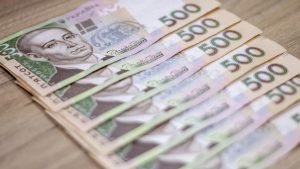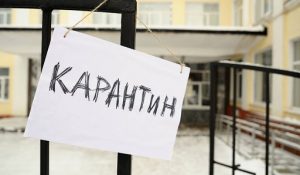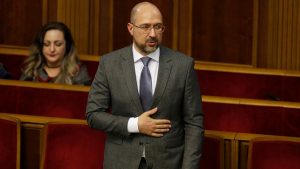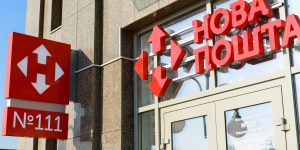
Вefore the introduction of quarantine due to the spread of the coronavirus disease (COVID-19) Ukrainian business improved its expectations regarding the slowdown in inflation in the next 12 months to 5.1% from 7% early this year and the strengthening of the hryvnia to UAH 26.01/$1 from UAH 27.43/$1.
According to the quarterly business outlook survey conducted by the National Bank of Ukraine (NBU) from February 4 through March 4, 2020, business was more restrained in expecting growth in production of goods and services in Ukraine in the next 12 months. Thus, almost 30.8% (37.6% a quarter earlier) of respondents expected an increase in this indicator, another 48.7% (45.5%) believed that they would remain at the same level.
According to the survey, business activity of Ukrainian enterprises decreased to a moderate level amid a reduction in the Business Outlook Index (BOI) for the next 12 months to 110.5% from 112% a quarter earlier.
The decrease in BOI was insignificant due to high business estimates for the total sales of own-produced products, investment costs for machinery, equipment and inventory, as well as the financial and economic condition of enterprises.
According to the survey, the share of companies expecting improvement in their financial and economic condition over the next 12 months fell to 27.6% from 28% the previous quarter, while those forecasting deterioration increased to 10.8% from about 10%. The regulator said that all surveyed enterprises, except for the water supply sector, had optimistic forecasts, and the mining industry had the most optimistic forecasts.

The number of unemployed in Ukraine in the first two weeks of quarantine increased by 500,000-700,000 people, over the next two weeks, in April, by another 500,000-600,000 people, to 2.5-2.8 million people, the Ukrainian Chamber of Commerce and Industry (UCCI) has said.
“According to the estimates of the Ukrainian Chamber of Commerce and Industry, the unemployment rate today is 13.7-15.4%. This is the highest rate in the last 15 years,” the press service said citing president of the chamber Hennadiy Chizhikov.
This figure does not take into account the number of labor migrants who returned to Ukraine after the start of pandemic, he added.
About 4 million people were employed in the “stopped” industries, he said.
“A survey of companies conducted by the Chamber of Commerce and Industry shows that 26% of them plan to reduce staff, another 30% have not made a final decision,” the expert said.
According to the agency, the total amount of support for businesses through tax exemption in March and April stood at UAH 9.3 billion, of which UAH 900 million was support for small businesses, which suffered the largest losses during quarantine.
“The estimated losses of only two sectors – beauty salons and passenger transportation – amount to about UAH 1.5 billion over a month and a half of quarantine. Losses of the entire businesses “in quarantine” are many times more,” he added.
As reported, according to the State Employment Service, on April 13 the number of registered unemployed amounted to 387,500 people, over the week this figure increased by 36,200 people.

Prime Minister Denys Shmyhal during Freedom of Speech of Savik Shuster program on Ukraine TV Channel later on Friday presented a brief strategy of gradual weakening of the quarantine for the period from early May by early July.
He also promised to report a more detailed plan, which is now being drawn up, in three or four weeks.
“This plan is under work, in fact we are working over it round the clock. As soon as it is ready and improved, it will be immediately presented to the public. Believe me, it would be one of the best [plan] among our neighboring states. It has credit holidays, and refinancing of loans, support for poor and unemployed,” the premier said.
According to his brief strategy, the first quarantine step called “Ukraine is going to work” is foreseen for early May – early June.
It involves the creation of 500,000 jobs, credit support for small and medium-sized businesses, partial removal of restrictions on public transport and a shifted work schedule.
The second stage named “New standards of social life” is scheduled for early June-early July.
During this period, it is planned to complete the 2019-2020 school year, restore the operation of public transport according to the new rules, allow access to recreation areas, subject to safety standards, and to weaken isolation conditions for older people.
Shmyhal emphasized that while Ukraine should adhere to the emergency regime in order to pass the epidemic according to the optimistic scenario with a drop in GDP to 5%, and not according to the pessimistic one, in which GDP fall is estimated at 15%.
In this emergency mode, according to the presentation presented by the prime minister, it is planned to support socially vulnerable segments of the population, to help the unemployed and those on forced leave, to mobilize medical resources and to support the medical staff and all those involved in the fight against the epidemic.

Nova Poshta group of companies set up more than 200 pick-up and drop-off points in Kyiv, Lviv, Chernivtsi, Uzhgorod and Kherson during quarantine, Nova Poshta said in a statement on Monday, April 6.
The company plans to increase the number of pick-up and drop-off points to 400 by the end of April.
“For the convenience of customers, we set up most of the branded pick-up and drop-off points inside grocery stores,” the company said.
Until the end of April, Nova Poshta plans to expand the network to 400 pick-up and drop-off points and install them in Dnipro, Odesa, Kharkiv, Poltava, Chernihiv, Sumy, Vinnytsia, Khmelnytsky, Mariupol and other cities.
Delivery of fully prepaid documents and parcels up to 30 kg of actual weight and a size of not more than 42x24x58 cm with a declared value of not more than UAH 6,000 is allowed at the pick-up and drop-off points.

The Aurum Group has said that it is necessary to annul the land tax in April 2020 to support business for the period of quarantine. The group paid attention of the government that ambiguous interpretations of the provisions of the so-called “anti-crisis law” adopted on March 30, according to which, in particular, the employer can be exempted from paying a fee for the use of property, will increase the loss of business from the consequences of quarantine.
“In March, in connection with the quarantine, the business was exempted from paying land tax, but in April, when the situation became even worse, the corresponding changes were not made,” the press service of the group told Interfax-Ukraine.
“Given the specifics of the activities and location of Aurum Group enterprises, the proportion of land tax of the tax burden of some companies ranges from 15% to 70%. In addition, in some regions, the land tax rate has doubled since January 1, 2020,” the press service said.
According to the company, the law on additional social and economic guarantees in connection with the spread of the coronavirus disease (COVID-19) provides an opportunity not to pay rent in commercial relations. However, in April, business must pay for renting land and real estate tax to the state.

PrJSC Volodymyr-Volynsky poultry factory (Volyn region), one of the largest poultry producers in Ukraine, has reached a 40% increase in sales of its Epikur brand due to the growth in demand for products since the beginning of quarantine measures in Ukraine, Head of the company’s supervisory board Alina Sych has said.
“In the conditions of market boom, the demand for poultry, as well as for many other food products, has grown by more than 50% and continues being high. Packaged products in the tray became more important, as these products are more biosafe,” she told Interfax-Ukraine.
According to Sych, this is not only because people are loading up on supplies in advance, but also most consumers mostly cook at home during quarantine.
The head of the company’s supervisory said that the sales growth of the Epikur brand increased monthly by 20%, and since the beginning of quarantine measures in Ukraine, the products had reached a 40% growth.
Sych said that in order to meet the growing demand, the poultry factory is operating at full capacity. “We try to keep prices at the same level, but due to a sharp increase in the exchange rate and an increase in the cost of goods and services as well, we are forced to respond to market fluctuations. For example, we buy chickens for rearing in the EU and the level of the euro affects the cost of production, which directly affects the price for consumers,” the head of the supervisory board said, adding that the price of Epikur products has increased from the beginning of quarantine by an average of 10%.
In connection with the coronavirus disease (COVID-19) spread in Ukraine, the poultry factory, as far as possible, transferred office workers to remote work, and for other employees, it strengthened preventive and control measures in line with the recommendations of the Health Ministry.
“We provided workers with masks and respirators, antiseptics are easy available. We regularly disinfect office premises, vehicles, and also follow other preventive measures. Now, it is impossible to enter the territory of the factory without a mask and temperature screening,” Sych said.
PrJSC Volodymyr-Volynsky poultry factory is a Ukrainian-Dutch enterprise. It is one of the five largest producers of chicken in Ukraine, occupying about 6% of the market. The infrastructure of the poultry farm includes 100 poultry houses located at 11 poultry breeding grounds, a slaughterhouse and a feed mill, as well as land for growing forage.